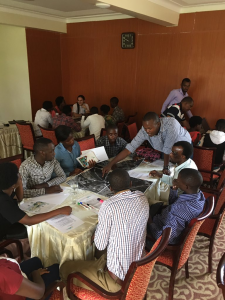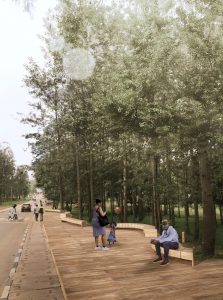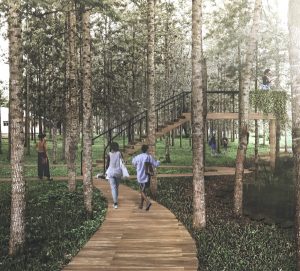Cities are considered to a critical role to play in transitioning from resource inefficient patterns of growth and increasing access to services, and in so doing, supporting the transition to green growth.
In 2018 , the Ministry of Infrastructure (MININFRA), the Rwanda Housing Authority (RHA), and the Global Green Growth Institute (GGGI) undertook citywide public space survey in Rwanda’s secondary city Nyagatare to comprehend the needs of citizens for public spaces as well as the necessary facilities and utilities to be include.
The survey findings in Nyagatare indicate residents were in favour of safe, inclusive, and accessible green and public spaces with a preference for leisure facilities. The citizens indicated that they are willing to walk and ride bicycles to and from public spaces and to maintain the cleanliness and functionality of these public spaces, thus contributing to its overall sustainability. In addition to the survey, a technical assessment of public spaces in Nyagatare was undertaken to gather information on what facilities and utilities are currently available in public spaces or their surroundings to support the next steps of the planning process.

Public space participatory design workshop in Nyagatare.
Following these processes, the city of Nyagatare hosted a two-day public space participatory design workshop organised by MININFRA, RHA, and GGGI. Local authorities assisted with site identification by analysis of land ownership and master plan and defined the boundaries of the public space. The selected area belonging to the central government , is surrounded by public buildings and commercial areas that would benefit from well-maintained public space.
The public space design workshop in Nyagatare mobilised citizens from different backgrounds to engage in the participatory design process, with each group listing the main elements that should be incorporated in the public space to ensure they do not affect the functioning of the existent ecosystems within the site. The participatory design workshop included an advisory session where all participants reached a consensus on where the public space design elements should be located within the chosen site.
The allocated site for public space is part of the proposed city-wide resilience infrastructure that could include a series of open spaces, water and infrastructure works, and a green network linking the peri-urban ecosystems with urban green areas. The green and public spaces will increase resilience and support the absorption of greenhouse gas emissions and so reduce the heat island effect, improving microclimate and regulating temperatures particularly in the dry season. This approach is promoting greater gender equality and socio-economic inclusion through safe, accessible public spaces for all.
After consulting with the citizens of Nygatare the design process was further elaborated by technical specialists from MININFRA, RHA and GGGI and presented to Nyagatare District Officials and stakeholders for validation and potential donors that would partner for implementation.

Illustrations of Design of green & public space in Nyagatare

Illustrations of Design of green & public space in Nyagatare
Green & public spaces were identified as one of strategic interventions to support sustainable urbanisation in the Nyagatare District Development Strategy 2018–2024.
The GGGI team in Rwanda embedded at the Ministry of Infrastructure continue to develop inclusive participatory approaches to gather credible and reliable data, by collecting information , assessing the information and deliberating on design process with relevant stakeholders.